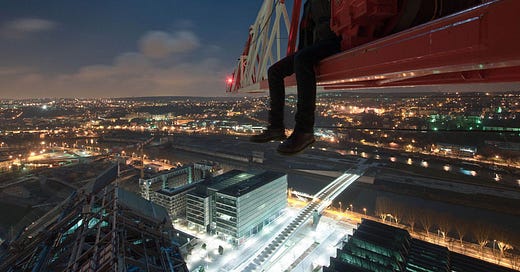The unaffordable cost of urban exploration
The "thrill" of illegally scaling cranes and tall buildings is costing lives, and it is costing the demolition and construction industry money.
A man was killed on a construction site in Manchester last week. My thoughts and prayers go out to his loved ones. Any site fatality is a tragedy.
But here’s the thing. The man shouldn’t have been there. He didn’t work there. He was trespassing. He had entered the site illegally and, as far as we can tell, scaled a crane before falling to his death.
As we speak, there is probably an internal review of site security measures taking place at the Wilmott Dixon site where the man died, and - quite possibly - at Wilmott Dixon sites up and down the country.
Those reviews will be necessary because, in all likelihood, Wilmott Dixon will have questions to ask about how the man made it onto the site in the first place. And they will have questions to answer because we now live in an age and in a society in which personal responsibility has given way to lawlessness.
We have all seen the videos online of people helping themselves to goods in a supermarket and then leaving without paying while store security looks on helplessly. We have seen videos of people ripping iPhones off the display in an Apple Store and just walking out, unchallenged. I saw one last week of a man who caught a bike thief attempting to steal his bicycle. Rather than running away, the would-be thief tried to wrestle the bike from its owners’ grasp, all while being filmed by stunned onlookers.
It feels like the judicial pendulum has swung too far. There was a time when a rape victim could be accused of “asking for it” because she was dressed provocatively. Such a notion is lunacy, of course, and I would like to think such attitudes are now a thing of the past. Yet today, thanks to that pendulum swing, a rapist could probably argue that his human rights were being impinged by his victim and that rape was merely a form of self-expression.
So now, as if the trauma of finding a dead body on one of their sites were not bad enough, Wilmott Dixon must now explain how they ALLOWED a man to gain access to their site; how they ALLOWED a man to scale a crane; and how they ALLOWED a man to fall to his death.
A construction company carrying the can for the reckless and illegal behaviour of someone not in their employment.
The crazy thing is that, in many cases, these site incursions are carried out under the guise of “urban exploration” or urbex, as it is known. Urbex enthusiasts break into demolition and construction sites with the sole intention of filming and photographing their illegal activities; the sprawling cityscape spread out behind and beneath them.
We now live in an age and in a society in which personal responsibility has given way to lawlessness.
They are fully aware of the risks and the hazards. This is from a website called urbexology.com:
“There are many risks associated with urbex. The most obvious is the risk of injury. Abandoned buildings and other structures can be dangerous places, with hazards such as unstable floors, sharp objects, and exposed cables. It is important to wear appropriate clothing and footwear and to be aware of your surroundings at all times.
Another risk of urbex is the risk of legal problems. Trespassing is illegal in most places, and if you’re caught exploring an abandoned building or other location without permission, you could face fines or even criminal charges.”
Urban explorers know that what they’re doing is trespass and is, therefore, illegal. But they do it regardless.
And here is, perhaps, the greatest irony of all. Not only do urban explorers flout the law, they film and photograph themselves doing it. They post their activities on YouTube, Instagram and Facebook. They are effectively producing evidence against themselves.
Yet, nothing is being done. And here’s the rub.
When these explorers enter a construction or demolition site, they expose property owners and contractors to potential lawsuits. If an explorer is injured while trespassing, the property owner may still be held liable, leading to costly legal battles. In many cases, property owners are forced to increase security measures, hiring additional personnel or installing surveillance systems, to deter trespassers, further adding to project costs.
In addition, construction and demolition projects operate on strict schedules and budgets. The presence of urban explorers can lead to costly delays in several ways. First, if trespassers cause damage - whether intentional or accidental - it may require additional repairs before work can continue. Broken windows, vandalised equipment, and damaged structures create unexpected expenses and disrupt carefully planned timelines.
Second, the need for increased security measures, such as fences, alarms, and guards, to prevent unauthorised access raises overhead costs. Some projects even require legal intervention or coordination with law enforcement, further draining resources.
So, in the grand scheme of things, one man perished on a Manchester construction site last week. He wasn’t the first and he won’t be the last. He lost his life in an instant. But through no fault of its own, the demolition and construction industry loses out in the long run.





